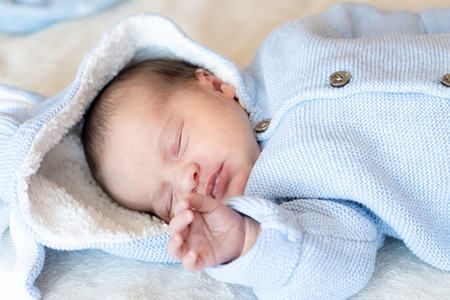 New parents tend to have a lot of questions about their baby’s sleep. How much should my newborn sleep each day? Does it matter where he sleeps? When will she begin to sleep all night? Because newborn sleep has a wide range of normal, it’s hard to know what to expect.
New parents tend to have a lot of questions about their baby’s sleep. How much should my newborn sleep each day? Does it matter where he sleeps? When will she begin to sleep all night? Because newborn sleep has a wide range of normal, it’s hard to know what to expect.
While every baby is different, newborns do have some typical sleep habits. As you’re getting ready to welcome your baby, get to know more about these common newborn sleep concerns.
Average hours and timing of sleep
Newborns sleep quite a bit over a 24-hour period. However, their sleep is typically split up into several small chunks. The National Sleep Foundation says the recommended total sleep time for newborns is 14 to 17 hours a day. However, some babies may need more sleep than this. For example, premature babies may sleep even more.
The amount a newborn sleeps at one time varies. It’s normal for your newborn to take short naps of less than an hour. At other times, newborns may sleep a few hours in a row. In general, you’ll likely get into a routine of feeding and awake time followed by a period of sleep time that repeats throughout the day.
Switching nights and days
Many new parents notice their newborn is sleepier during the day. Then, at night, the baby is more alert. If you’re experiencing a lot of wake ups at night, you’re not alone. It’s normal for newborns to switch day and nighttime activity. And it may take some time for your newborn to slowly switch back.
To help with this concern, the American Academy of Pediatrics says to create an environment that clearly defines night and day for your newborn. This might mean allowing noises, lights, and lots of interaction during the day, while keeping lights off and limiting interactions at night to just feeding, diapering, and back to sleep.
Signs your newborn is sleepy
One important piece of newborn sleep is knowing the signals that your baby is getting sleepy. It can help to try to get your baby to sleep at these first signs before he or she becomes overtired. Look for signs like less social engagement, pulling ears, or rubbing eyes. Most babies will then progress to fussiness or crying.
The U.S. National Library of Medicine says many parents find it helpful to put their baby to sleep when he or she is almost asleep but not completely there. This can help set up your baby for easing into sleep on his or her own later on.
Safe sleep environments
From where your newborn sleeps to how you lay him or her down, it’s also important for all new parents to know about safe sleep. You can take several steps to reduce your baby’s risk of sudden infant death syndrome (SIDS) or other sleep-related accidents.
The CDC says to always place your baby on his or her back on a firm sleep surface. While swaddling, sleep sacks, or other wearable blankets are fine, avoid putting any loose bedding, blankets, pillows, bumper pads, or stuffed animals with your baby.
Sounds and movement during sleep
You may be surprised newborns can be noisy sleepers. It’s not unusual for newborns to grunt, whimper, snort, or make other noises during sleep. Depending on the stage of their sleep cycle, they may also jerk or move as well.
In general, this variety of noises, movements, or breathing sounds isn’t anything to worry about. However, the American Academy of Sleep Medicine says signs of sleep apnea—like long pauses in breathing over 20 seconds—signal a need to talk to your doctor. This condition is rare in full-term newborns but more likely if your baby was premature.
Find what works for you
In the end, you may get a lot of different advice about infant sleep. Some of it may work for your baby. And some of it may not. That’s because infant sleep has such a wide range, and some babies naturally have an easier time falling and staying asleep than others.
One study in Sleep Medicine showed many babies begin to fall asleep more easily by 6 months, but parents still reported a variety of sleep concerns throughout the first and second years of life. Keep trying different routines or methods for soothing your baby to sleep until you find one that works best. As your baby grows, you may go through phases of less sleep or need to adjust your routine again.
If you continue to struggle with sleep or have concerns, talk with your doctor for additional help. While it may take more time for some, you’ll eventually settle into a new sleep routine that works for you both.
